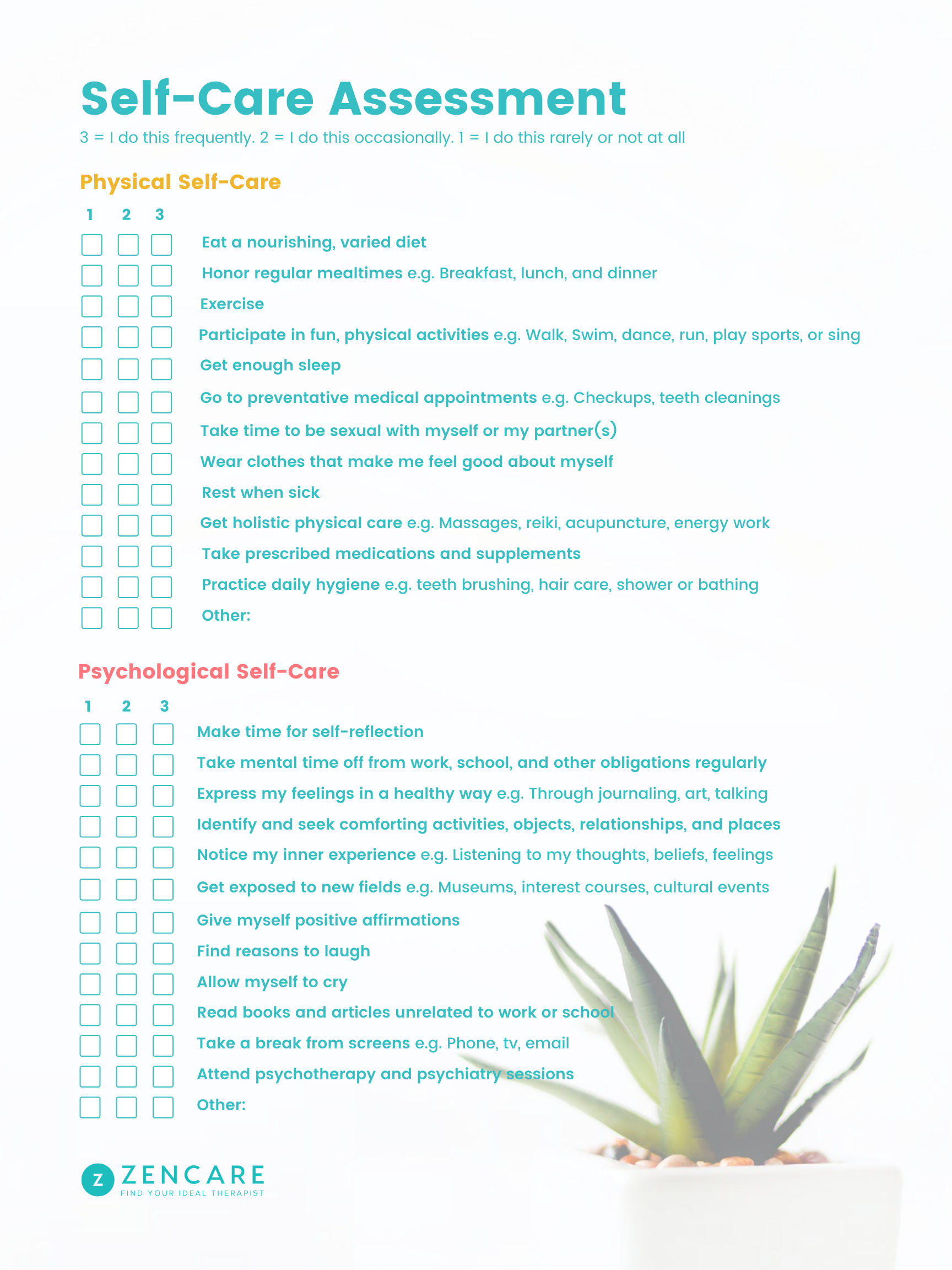Self-care has become something of a buzz term in recent years, but it's one that's well worth the hype. In today's fast-paced world, taking the time to deliberately focus on yourself is key for overall health, balance, and wellness.
And while it’s a simple concept in theory, self-care is often overlooked and can be challenging to prioritize. To make it a bit easier, we've put together this self-care assessment guide. It's designed to help you analyze how well you're tending to your personal self-care needs, spot any helpful or less-than-ideal patterns, and prioritize areas that may need extra attention.
How to use this self-care assessment tool
In this self-care assessment, you’ll use a rating system to measure the quality and frequency of your self-care practices across two categories of self-care: Physical and Psychological.
Here are the ratings:
- I do this poorly / I do this rarely or not at all
- I do this OK / I do this sometimes
- I do this well / I do this often
- I would like to improve at this / I would like to do this more frequently

In each of these categories you’ll consider activities that you currently engage in or plan to engage in and assign a rating to each activity.
Examples of physical self-care activities may include:
- Being intentional about filling your plate with nourishing, varied food
- Taking time to exercise in a way that feels good for your body
- Taking care of personal hygiene
- Dressing in a way that makes you feel good about yourself
- Resting when sick or tired
Examples of psychological self-care activities may include:
- Journaling
- Taking time for self-reflection
- Blocking out distractions
- Recognizing strengths
- Practicing gratitude
- Spending time with loved ones
- Engaging in a hobby with others
- Calling or writing an old friend
- Meditating
- Engaging in a faith-based activity or meaningful cause
- Spending time in nature
- Appreciating art
- Participating in professional development
- Taking on interesting or rewarding projects
- Finding a work-life balance
- Maintaining an organized, comfortable workspace
Part of self-care if being kind to and forgiving of yourself. It’s okay if you can’t rate yourself a 2 or a 3 in for each activity.
Remember that developing and utilizing a self-care practice is an ongoing process – while it can be time-consuming at first, carving out space for it in your daily life pays dividends in terms of emotional resilience, sense of wellbeing and balance, and overall health.
How to develop sustainable self-care practices
Now that you have the assessment, let's make sure its sustainable! Here are suggestions to ensure the practice can fit into your everyday rhythm in the long run:
- Stick to the basics while you find your rhythm and develop a routine. Start with a commitment to one activity - don’t overdo it!
- Actively plan to practice self-care. Put activities on your calendar or announce your self-care plan to others as a form of accountability.
- Develop an awareness of which activities actually improve your mood and make you feel well cared for. Remember practicing self-care should be an enjoyable experience that has lasting effects.
- Create a “no” list. Sometimes it’s easier to distinguish what is harmful to your mental and emotional health rather than what’s beneficial. Self-care can also mean saying “no” to things you don’t enjoy.
- Consider the importance of sleep, eating habits, and physical activity.
- Follow up with medical care.
- Incorporate mindfulness practices.
- Engage in relaxing and pleasurable activities.
Consider seeking support from a therapist
Self-care practices can be utilized on your own; however, when faced with life’s challenges, it isn’t always easy to prioritize caring for yourself.
A therapist who specializes in the following types of therapy can help you incorporate self-care practices in order to improve mental, emotional, and physical health:
- Cognitive Behavioral Therapy: This approach to psychotherapy brings awareness to how unhelpful thought patterns or beliefs impact your emotions and behavior.
- Mindfulness-Based Stress Reduction: MBSR is a group therapy that uses mindfulness practices to increase awareness and compassion.
- Positive Psychology: This approach to psychotherapy aims to improve emotional well-being and functioning by building on positive emotions, relationships, and strengths.
- Strengths-Based Therapy: This approach to psychotherapy places emphasis on what is going well in our lives.
- Solution-Focused Therapy: With this approach to psychotherapy, the therapist and client collaborate to develop solutions to problems using the client’s personal strengths and skills.
